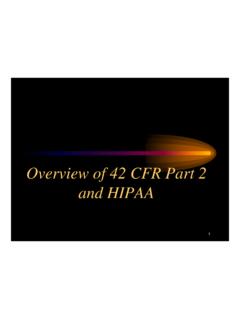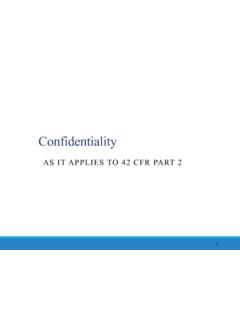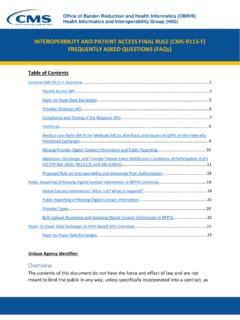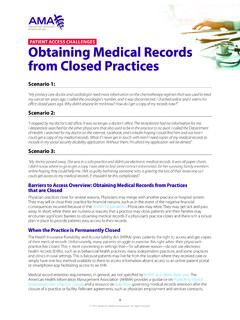Transcription of Request for Applications: Behavioral Health Justice ...
1 Request for Applications: Behavioral Health Justice Intervention Services (BHJIS). At a Glance DHCS is looking for Behavioral Health agencies and first responder, law enforcement, and community stakeholder groups that want to improve and enhance their collaborative response to individuals facing mental Health or substance use crises. $ million is available to support local and statewide efforts to improve first responder, law enforcement, and other community efforts to address Behavioral Health crises. These funds support collaborative planning, capacity building, strategic program development and first-year implementation.
2 Application requests must be a minimum of $50,000 and no more than $700,000. each. Register for the Informational Webinar Here Informational Webinar: December 8, 2021, 12:00 p. m. 1:00 p. m. (PST). Submit completed application, narrative questions for scoring, and budget document and justification by December 22, 2021, 4:00 (PST). 1. Introduction and Background The California Department of Health Care Services (DHCS) has contracted with Advocates for Human Potential, Inc. (AHP), as the Administrative Entity to assist DHCS. in overseeing and implementing the Behavioral Health Justice Intervention Services (BHJIS) Project.
3 Funding to support BHJIS was awarded to DHCS by the Substance Abuse and Mental Health Services Administration (SAMHSA) through the Coronavirus Response and Relief Supplemental Appropriations Act (CRRSAA). DHCS has allocated $ million of SAMHSA CRRSAA funds for BHJIS. The purpose of BHJIS is to support local and statewide efforts to improve first responder, law enforcement, and other community efforts to address Behavioral Health crises. BHJIS provides funding to help local communities address critical intervention points through which individuals with mental and substance use disorders can be diverted from criminal Justice involvement.
4 Funds may be used for a wide array of collaborative planning, development activities, and training. Funds may also be used for first-year implementation, including hiring or contracting with Behavioral Health clinicians and/or peers to be embedded with law enforcement, emergency medical technicians (EMTs), or other first responders when responding to community situations, or integration of harm reduction, reentry support, and diversion strategies. SAMHSA has developed the Sequential Intercept Model (SIM) to detail how individuals with mental and substance use disorders come into contact with and move through the criminal Justice system (please see the graphic below).
5 More information can be found at Eligibility Criteria Any public or private nonprofit entity in good standing and authorized to do business in California, as well as any tribal entity, state or local government entity, or school district is eligible to apply. This includes law enforcement agencies, fire departments, community Behavioral Health agencies, and community-based or other qualified organizations. Tribal entity is defined as a federally recognized Indian tribe, tribal organization, or urban Indian organization, as defined in Section 1603 of Title 25 of the United States Code.
6 Applicants must demonstrate the ability to improve partnerships/collaboration, address structural inequities, and implement specific projects that will meet the BHJIS goal. 2. Any entity listed with the General Services Administration as debarred or suspended is ineligible to receive BHJIS funds. All applicants must meet the terms and conditions for BHJIS funding. Funding and Period of Performance Application requests must be a minimum of $50,000 and no more than $700,000. The estimated contract term is from February 15, 2022, through February 14, 2023 (1 year).
7 For all grant recipients, AHP will contract with one lead agency to approve its subcontracting partners, if any. All funds must be expended by February 14, 2023, or they will be forfeited. AHP will work with each award recipient to establish a statement of work, deliverable schedule, and implementation plan. Scope of Work DHCS is looking for agencies in the law enforcement, first responder, and Behavioral Health communities that will: Implement innovative solutions to problems Benefits of Behavioral and connect people experiencing mental or Health Integration and substance use crises with services at the right Diversion Practices time in the right environment.
8 Reduce arrests and Utilize best practices of SAMHSA, the Bureau costly jail stays of Justice Assistance (BJA), and Crisis Now, Reduce lengthy and including co-responder models and/or the costly competency Memphis Model Curriculum or a Crisis involvement Intervention Team Commission on Peace Connect individuals Officer Standards and Training (CIT-POST) with resources and certified curriculum; support within their Demonstrate collaboration between system own communities partners and communities; and Adopt policies and practices to promote diversity, equity, and inclusion and establish culturally and linguistically appropriate services.
9 Projects must be doable within approximately one year. Funds must be used to build capacity. DHCS is also making funding available to support some initial implementation of direct services. Capacity-Building Activities Recognizing that communities have different needs and resources, AHP will consider a wide array of proposed projects. Examples of allowable capacity-building activities include the following: Establish short-term or ongoing local, regional, or statewide community action councils, workgroups, advisory committees, or other multisystem groups to address and implement cross-systems collaboration between law enforcement and the Behavioral Health system that should include capacity building, values clarification, and service continuum of care.
10 Membership should be broad and include community members and system partners. 3. Identify service and resource gaps through intercept or system mapping and create a sustainable action plan to address these gaps. Establish agreements for warm handoffs to community wellness, harm-reduction, stabilization, detoxification, peer respite, or other receiving centers. Assess long-term financial needs, including sustainability, braided funding, identification of funds, training on allowable costs, billing, and tracking. Develop data collection and appropriate sharing mechanisms.







